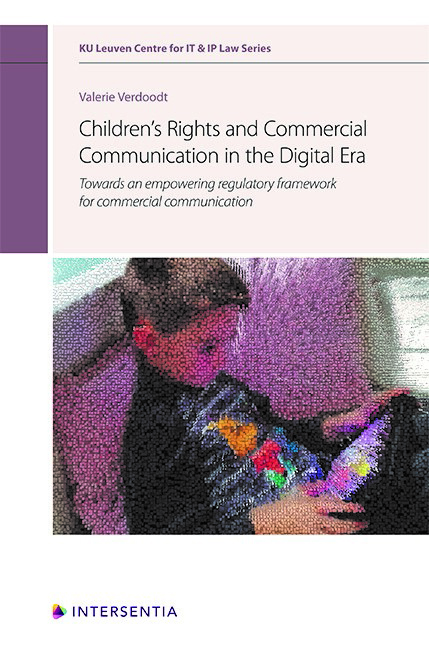 Children's Rights and Commercial Communication in the Digital Era
Children's Rights and Commercial Communication in the Digital Era Book contents
- Frontmatter
- Preface
- Contents
- Abbreviations
- Introduction
- PART I CHILDREN'S RIGHTS AND ADVERTISING LITERACY IN THE DIGITAL ERA
- PART II ASSESSMENT OF THE REGULATORY FRAMEWORK FOR COMMERCIAL COMMUNICATION IN LIGHT OF CHILDREN'S RIGHTS
- PART III ASSESSMENT OF NATIONAL ARIS IN THE AREA OF COMMERCIAL COMMUNICATION
- CONCLUDING REMARKS AND RECOMMENDATIONS FOR THE FUTURE
- Bibliography
- Miscellaneous Endmatter
Chapter II - Functional Comparative Assessment of National ARIs
Published online by Cambridge University Press: 23 July 2020
- Frontmatter
- Preface
- Contents
- Abbreviations
- Introduction
- PART I CHILDREN'S RIGHTS AND ADVERTISING LITERACY IN THE DIGITAL ERA
- PART II ASSESSMENT OF THE REGULATORY FRAMEWORK FOR COMMERCIAL COMMUNICATION IN LIGHT OF CHILDREN'S RIGHTS
- PART III ASSESSMENT OF NATIONAL ARIS IN THE AREA OF COMMERCIAL COMMUNICATION
- CONCLUDING REMARKS AND RECOMMENDATIONS FOR THE FUTURE
- Bibliography
- Miscellaneous Endmatter
Summary
INTRODUCTION. After identifying a number of procedural safeguards and general principles or benchmarks for ARIs in the previous chapter, this chapter studies the procedural and organisational elements of three national ARIs, in order to extract best practices for ARIs aimed to protect and empower children in the context of new advertising formats. The selection of national ARIs is explained in a first subsection and the second subsection contains the actual comparative assessment.
SECTION I. SELECTION OF NATIONAL ARIS AND QUESTIONS FOR THE COMPARATIVE ANALYSIS
SELECTION OF NATIONAL SYSTEMS. There are two principal factors that are decisive in determining the structure or form that ARIs may take in any country. First of all, it is the countries’ tradition (i.e. the combination of cultural, commercial and legal traditions) that influences the self-regulatory system. According to Durovic and Micklitz, consumers in different countries and regions will respond differently to the same advertising practices. Consequently, the regulation of advertising is supposed to take into account the cultural dimension. Second, it depends on the opportunity of ARIs to exist next to legislation. ARIs are (usually) complementary to legislation. Accordingly, in countries where detailed and extensive legislation on commercial communication exists, the role of ARIs will be smaller than in those countries in which the legal framework exists only of broad principles. Considering these two decisive factors, it can be said that advertising ARIs across the EU have taken different forms, which differ significantly. Indeed, while certain countries have opted for the use and promotion of self-regulation, others only foresee a limited role for self-regulatory organisations, or the co-regulatory structure dominates the system. In light of this, Belgium, the Netherlands and the United Kingdom have been selected after a preliminary study, as their systems are well-developed but significantly different. More specifically, in Belgium and the Netherlands, rules are integrated in self-regulatory instruments, whereas in the United Kingdom the rules on commercial communication are integrated in a complex co-regulatory framework which includes elements of statutory legislation and self-regulation.
QUESTIONS GUIDING THE COMPARATIVE ANALYSIS. The assessment can be divided into three sub questions, for which a number of elements of assessment have been defined, based on the analysis conducted in the previous chapter (i.e. the analysis of children's procedural rights and the general principles or benchmarks for the procedural and organisational aspects of ARIs at the EU level).
- Type
- Chapter
- Information
- Children's Rights and Commercial Communication in the Digital EraTowards an Empowering Regulatory Framework for Commercial Communication, pp. 257 - 282Publisher: IntersentiaPrint publication year: 2020


